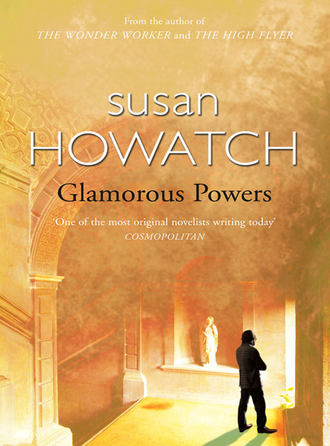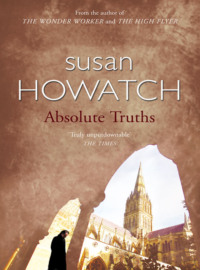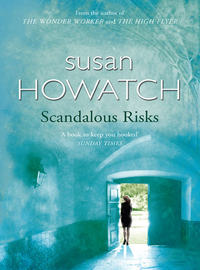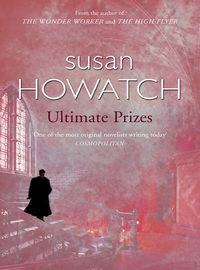
Полная версия
Glamorous Powers
In the end his henchmen dragged him away and I was left to laugh at the incident, but I only laughed because at that moment my psychic faculty was dormant and I never foresaw the future. A month later the lady, who had been telling everyone I had miraculously cured her abdominal pain, became violently ill, and in hospital it was discovered that her appendix had ruptured. She died twenty-four hours later.
I knew that because I had temporarily removed the pain she had refrained from seeking medical advice until it was too late, and as the enormity of the catastrophe overwhelmed me I perceived for the first time the danger in which I stood. Contrary to what I had supposed my psychic powers made me not strong and impregnable but weak and vulnerable, a prey to any passing demonic force. I had used my powers to serve myself and the result had been tragedy. I now realized I had to use my powers to serve God, not merely in order to be a good man but in order to survive as a sane rational being, and as I finally recognized a genuine call to the priesthood I stumbled through the meadows which separated Cambridge from Grantchester and knocked on the door of the Fordite monks.
IX
At that stage of my life I had no thought of being a monk. I was merely desperate to obtain absolution from someone who, unlike the stern authorities at Laud’s College, might hear my confession with compassion, and if anyone had told me that one day I would myself enter the Order I would have laughed in scorn.
It would be edifying to record that my spiritual problems were solved once I came under the Abbot of Grantchester’s direction, but although James Reid was the holiest of men he was quite the wrong director for me. I liked him because he was fascinated by my psychic gifts and this, I regret to say, enhanced my pride by making me feel special. The result was that I fell into the habit of using my powers to manipulate him until we had both fooled ourselves into believing that we had achieved a successful ‘rapport’. In retrospect the truth seems obvious: I was still so spiritually immature that I could only tolerate a director who cocooned me in indulgence, and beyond my genuine desire to devote my life to God’s service, my psyche was as disruptive and undisciplined as ever. The years of my troubled priesthood had begun.
I saw no more of Francis after we came down from Cambridge, and for a time I was so absorbed by my preparations for ordination that I never thought of him, but five years later when I was a married Naval chaplain I heard the astonishing news that he had entered the Order. He began his monastic career at the Starwater house, some forty miles from where I worked at the Naval base in Starmouth, but I had lost touch with the Fordites by that time and I saw no reason why I should ever meet Francis again.
However word of his progress continued to reach me as he rose with lightning speed to the office of Bursar, no mean post in a place like Starwater Abbey where there was a large school to run and complex accounts to be kept. He was still at Starwater when I myself entered the Order in 1923, but as my career was unfolding at Ruydale we never met. Nor did we correspond. He represented a past which I could remember only with shame, and I suspected that I represented a similar burden of guilt to him. But then in 1930 he was transferred to the London headquarters in order to assist its ailing Bursar, and in a flash of foreknowledge I knew that our lives were drawing together again after completing some enigmatic circle in time.
Our reunion came sooner than I had anticipated. I underwent a period of crisis which I have no intention of describing so I shall only record that it concerned the house-cat, Whitby, and nearly terminated my career as a monk; Father Darcy had to be summoned to Yorkshire to set me back on the spiritual rails. I recovered from my crisis, but six months later Father Darcy decided to reassure himself that I had fully surmounted the disaster which was now known as ‘The Whitby Affair’, and I was summoned to London for an inspection.
The summons was most unusual. No one ever visited London from Ruydale except Aidan, who was obliged to travel there once a year for the Abbots’ Conference, and although I was apprehensive at the prospect of being inspected by Father Darcy I was also flattered that I was to receive special attention. However when I arrived in London in a state of wary but not unpleasant anticipation it was a rude shock when I found myself welcomed not by the Guest-Master but by the new Bursar, Francis Ingram.
‘So you’re still as lean as a lamp-post!’ he exclaimed. ‘But what happened to those owlish spectacles?’
‘My sight improved with age. What happened to the greyhound?’
‘He died of a surfeit of champagne.’
We laughed, shaking hands as if we were the oldest of friends, but I was unnerved by his aura of hostility. It lay like a ball of ice beneath the warmth of his welcome; to my psychic eye it was unmistakable, and immediately I heard myself say: ‘Perhaps we should agree to draw a veil over the past.’
‘Should we? Personally I think it’s more honest to face one’s disasters and chalk the whole lot up to experience. After all,’ said Francis, suddenly fusing his middle-aged self with the undergraduate of long ago, ‘Wilde did say that experience was the name men give to their mistakes.’
I said with as much good humour as I could muster: ‘Still quoting Wilde? I’m surprised our superior permits it!’
‘Then perhaps now’s the moment to make it clear to you that I’m the favourite with a licence to be entertaining,’ said Francis at once, and as he smiled, making a joke of the response, I recognized the demon jealousy and knew our old rivalry was about to be revived in a new form.
I said abruptly: ‘You’ve told him about the past?’
‘How could I avoid it? As soon as the rumour reached London that you’d got up to something thoroughly nasty with a cat I said: “That reminds me of my salad-days.” And then before I knew where I was –’
‘He’d prised the whole story out of you.’
‘But didn’t he know most of it anyway?’
‘I admit I told him about the Cambridge catastrophe, but I never mentioned you by name! And now, of course, he’s decided it would be amusing as well as edifying to batter us into brotherly love – he’s summoned me here not just to put my soul under the microscope but to purge us of our ancient antipathy!’
This deduction proved to be all too correct. Every evening after supper Father Darcy would summon us to his room and order a debate on a subject of theological interest. The debates lasted an hour and were thoroughly exhausting as Francis and I struggled to keep our tempers and maintain an acceptable level of fraternal harmony. Afterwards Father Darcy would pronounce the winner, dispatch Francis and embark on a fresh examination of my spiritual health. By the end of the week I was so worn out that I could hardly drag myself back to Yorkshire.
Before my departure I said in private to Francis: ‘I hope the old man doesn’t intend to make a habit of this. All I want is a quiet life at Ruydale.’
‘Dear old chap!’ said Francis. ‘You don’t seriously expect me to believe that, do you? After a few years of living on the Yorkshire moors a man of your ambition would feel like Napoleon marooned on St Helena!’
‘I don’t think that’s funny, Francis.’
‘I’m hardly delirious with amusement myself.’
‘Obviously you see me as a rival, but I assure you –’
‘Don’t bother. I’m not in the mood for hypocrisy.’
‘What’s this – a nursery tantrum? I’ve never seen such an unedifying exhibition of jealousy in all my life!’
‘And I’ve never seen such a plausible performance of a holy man devoid of ambition, but my dear Jonathan, just answer me this: has it never occurred to you that for a holy man devoid of ambition you seem to be carving out a quite remarkably successful career?’
I turned my back on him and walked away.
X
It is a relief to record that this disgraceful scene was not repeated; no doubt Francis was afterwards as ashamed of our hostile exchange as I was, and when we met again he even took the initiative in apologizing for the incident.
I paid six more visits to London before I was transferred to Grantchester, and each time Father Darcy pitted us against each other in debate, dragged our antipathy into the open and, in a metaphorical sense, rubbed our noses in the mess to discourage us from further antagonism. I was reminded of how one house-trains a cat. In the end Francis and I were so chastened by this remorseless spiritual purging that we almost became friends, but I never felt I knew him well. My psychic faculty, blunted by the antipathy which we both learnt to master but not erase, was dead in his presence. I received no insights which would have offered me the key to his character, nor could I perceive the texture of his spiritual life. Our debates had revealed his powerful intellect, but I came to the conclusion that although he was intellectually able he was spiritually limited and that this fact lay at the root of his jealousy. He was quite intelligent enough to know his limitations, more than intelligent enough to conceal them whenever possible and certainly human enough to resent a man who displayed the gifts he secretly coveted but knew he would never attain. He was also, I soon realized, deeply envious of the effortless psychic understanding which existed between Father Darcy and myself, and when I realized how much he depended on our mentor’s approbation I found myself driven to question the propriety of their relationship.
Father-son relationships are as forbidden in the cloister as the notorious ‘particular friendships’ which prurient laymen find so titillating, but I thought that Father Darcy, in characteristic fashion, might be riding roughshod over the rules in order to give Francis some form of psychological security which could prove beneficial to his character. I was not jealous. I had no desire whatsoever that Father Darcy should treat me as a son; I had a tough enough time surviving his attentions as a spiritual director. But I did wonder if Father Darcy were taking an unwise risk, and I wondered too, as time passed, if he were using Francis to gratify some immaculately concealed emotional need.
I knew I was of intense interest to Father Darcy but the interest was essentially detached; I was just the parlourmaid’s son who had presented him with the challenge of a monastic lifetime but who could nonetheless be kept at arm’s length in Yorkshire. But Francis was the man from his own class with whom he could feel at ease, the man who had to be transferred to London not merely to supervise the Order’s financial affairs but to keep the Abbot-General company in his old age. Such a situation was all very comfortable for Father Darcy, but was it good for Francis? I often considered this question but could never answer it with any degree of confidence. Perhaps Francis needed this special attention in order to make the most of those limited spiritual gifts. It was possible. With Father Darcy any bizarre monastic situation was possible – as I realized all too clearly when he lay on his deathbed and declared that his successor must be a man who could tell vintage claret from Vin ordinaire’.
Francis took care to say to me afterwards: ‘I’d like to think that despite the old man’s appalling final antics we can somehow contrive to be friends.’
‘Of course. Why not?’ I said equably before retreating to my cell to seethe with rage.
‘I fear I shall still worry in the future about you and Francis,’ confessed Aidan to me after the funeral, but I only answered with all my most fatal arrogance: ‘I can’t imagine any difficulty arising which can’t be easily resolved.’
Less than two months later I received my summons to London and I travelled there in the knowledge that I was deep in difficulties which were incapable of an easy resolution. Moreover after years of rivalry Francis now had me where he wanted me: in a position which was utterly subject to his will.
It was a bitter pill to swallow.
XI
Journeying beyond the walls of one’s cloister was always a disturbing experience – I shall never forget my first journey from Ruydale to London when I encountered the amazingly exposed legs of two flappers on the train – and now I found myself more disturbed than ever. But this time I barely noticed the female passengers. I was too busy reading The Times. It seemed the French had collapsed; Pétain had ordered a cessation of the fighting and was in touch with the Nazi command. For weeks the countries of Europe had been falling to the Nazis and now after the collapse of Denmark, Norway, the Netherlands and Belgium it appeared that France too had been conquered. Without the French we would be quite alone. More than fifteen hundred years of Christian culture hung by a thread and the Devil’s breath was hot upon our necks.
I found myself thinking that the chaos in the world mirrored the chaos in my psyche. I saw my career as a monk hanging by a thread, and as I forced myself to acknowledge that my vision could have been a delusion I was aware of the demonic menace which always had the power to annihilate me. A second later I was trying to recover my equilibrium by telling myself I should put my trust in God, but the trouble was, as I well knew, I was quite unable to put my trust in Francis Ingram.
Unless I wanted to be judged an apostate I could not leave the Order without his permission, and that meant my entire future rested on his ability to exercise the charism of the discernment of spirits, the gift from God which enabled a man to perceive whether a situation was divinely or diabolically inspired. Francis, as I had long since decided, was spiritually limited. This did not mean he was incapable of exercising the charism of discernment, for with God’s grace even the most unlikely people can display charismatic powers, but it did mean that I had ample opportunity to worry about how far he was capable of placing himself in God’s hands so that he might act as a channel for the Holy Spirit. Francis was a clever, cunning, efficient, ambitious, jealous, charming and outwardly devout monk. But was he a good one? I found I could derive no reassurance from reflecting that Father Darcy would hardly have willed the Order to a monk who was merely a first-class administrator. Sickness had undermined Father Darcy’s powers at the end of his life, and it was more than possible that in a moment of weakness he had given way to the temptation to leave the Order not to the best monk he ever trained but to the best son he never had.
These lowering thoughts occupied me throughout my journey on the underground railway from Liverpool Street Station to Marble Arch. Then I pulled myself together as best I could, gathered up a few scattered shreds of faith and trudged north through the brilliant June sunshine to the townhouse which had once belonged to the Order’s founder, Mr Horatio Ford.
XII
‘My dear Jonathan, how wan you look!’ said Francis in his most theatrical voice as I entered the room where he conducted his daily business. ‘But then the news in this morning’s Times is enough to make anyone blanche. I confess I’m seriously tempted to buy a wireless in order to hear Mr Churchill’s broadcast tonight – only the thought of Father Darcy turning in his grave deters me.’
‘If Father Darcy were alive he would already have discovered what kind of wireless the Archbishop keeps at Lambeth Palace and he’d be busy ordering a better one from Harrods!’
We laughed. The interview seemed to have begun in a promising spirit of amity, but I was acutely aware that the amity was no more than skin-deep.
When I had first met Francis in his gilded youth I had been reminded of that famous acid description of Julius Caesar: ‘He was every man’s woman and every woman’s man.’ But despite this appearance of ambivalence he had paid carnal attention only to the opposite sex and it was not until years later, when I became enamoured with modern psychological theories, that I suspected he was a homosexual who had indulged in heterosexual affairs to conceal his true inclinations not only from the world but from himself. Later still, when I had become far more cautious in applying modern psychology to complex characters, I became less confident of this facile diagnosis and wondered if the effete airs of Francis’ youth had merely been part of a mask he had assumed in order to draw attention to himself; I even wondered if the mask had been his way of damping down strong heterosexual inclinations which he believed might disrupt his life disastrously. But whatever the truth was about his sexuality the fact remained that in his maturity no one could have called him effete. He was a tall man, though not as tall as I was, and the passing years, stripping aside the air of decadence, had substituted a flamboyant air of distinction. He had fine dark eyes, expressive dark eyebrows and a remarkable head of silver hair which he wore longer than a monk should, no doubt out of vanity. I was surprised Father Darcy had permitted it. The Fordites may have dispensed with the medieval custom of the tonsure, but they are still expected to keep their hair decently short.
As I entered the room and we embarked on our friendly opening remarks he moved gracefully around the corner of his large handsome desk to meet me. The room too was large and handsome, littered with the antiques old Ford had left behind, and, as Father Darcy had once boasted smugly: ‘More than a match for any of the Archbishop’s private chambers at Lambeth.’ Father Darcy had been dangerously bold in his belief that to attract worldly respect the Order should present a worldly façade, and personally I deplored such a policy. The Abbot-General’s office in which I now stood was in the enclosed part of the house which meant that no one outside the Order ever saw it, but nevertheless it was furnished as lavishly as the Abbot-General’s parlour where important visitors were received. There was even, I regret to record, a peculiarly gross chandelier hanging from the centre of the ceiling.
After we had laughed with studied heartiness at the thought of Father Darcy ordering the latest wireless from Harrods, we moved swiftly through the formula of cenobitic greeting like actors in a well-rehearsed play. As Francis paused by the desk I knelt, touched his abbot’s ring with my lips and then rose to shake his hand. A moment later we were both seated facing each other across his desk.
‘I’m sorry to hear you have a difficulty with your son,’ said Francis, idly picking up my letter in which I had requested his permission to visit Yorkshire. ‘What’s the trouble?’
‘As it happens I’ve now decided that Martin isn’t my main worry at present.’ I had to will myself to add: ‘My major difficulty lies elsewhere.’
Francis, who had been rereading the letter, at once glanced up. ‘Oh?’ he said. ‘And what, may I ask, is your major difficulty?’
I said: ‘I want to leave the Order,’ and at that moment the die was cast.
TWO
‘When Tertullian, who was not a mystic, says that most men apprehend God by means of visions, we realize how natural it seemed to the ancients to believe that these experiences were a genuine and by no means unusual revelation.’
W. R. INGE
Dean of St Paul’s 1911–1934
Mysticism in Religion
I
I had expected a theatrical reaction but none came. Not a muscle moved in Francis’ face; his fine eyes were unreadable. Finally he dropped the letter on his desk, donned a pair of spectacles and produced from a drawer a clean sheet of foolscap. Then after dipping his pen in the ink he wrote at the top of the page: ‘JONATHAN DARROW: 17th June, 1940,’ and said casually: ‘I assume that when you say you want to leave the Order this isn’t a mere whim that’s tickled your fancy?’
‘I’m sorry, I expressed myself badly. What I want is of course quite irrelevant. But I believe this is what God wants.’
Francis underlined his heading and asked: ‘When were you first aware of this call?’
‘May the seventeenth.’
Francis raised an eyebrow, ostentatiously examined his desk-calendar and allowed a pregnant pause to develop. But eventually all he said was: ‘How did you become aware of the call?’
‘I had a vision.’
A second pause ensued and was allowed to reach a far more advanced stage of pregnancy. Francis took off his spectacles, dangled them between his thumb and forefinger and glanced at the chandelier as if each crystal had demanded a careful inspection. Then replacing his glasses he pushed them down to the tip of his nose and looked at me over the frames. Francis had a whole series of such mannerisms; I always found them excessively irritating.
‘You had a vision.’
‘Yes.’
‘You had a vision of profound importance on the seventeenth of May and yet it’s only now that you deign to confide in your superior?’
‘I felt I needed time for reflection.’
‘How arrogant! You have what can only be described as a disruptive experience which must inevitably have affected your spiritual life, and yet you coolly decide you’re in a position to reflect on the experience at leisure!’
I said at once: ‘I was in error. I’m sorry.’
‘So you should be.’ Pushing back his glasses to the bridge of his nose he wrote: ‘Reflects for a month but now admits the arrogance of his failure to confide in me immediately.’ On completing this sentence he added in his most acid voice: ‘And now I suppose you’ll tell me that you’ve failed to confide in your confessor! Incidentally, who is he?’
‘Timothy.’ Remembering that Francis had not yet visited the house at Grantchester I offered the most fundamental description I could devise. ‘He’s our senior monk, a very good, holy old man.’
‘Cosy for you,’ said Francis. ‘I’m only surprised Father Darcy sanctioned someone so pliable, but then I suppose he thought you couldn’t go too far astray so long as he was alive to keep an eye on you.’
I said nothing.
‘Very well,’ said Francis, writing the word ‘VISION’ on a fresh line, ‘You’d better tell me what happened,’ and I began my account of the abnormal in the most normal voice I could muster.
II
When I had finished Francis drew a line under his last note and stared in silence at the written page. ‘Is that all?’ he said abruptly at last. ‘There weren’t, for example, six naked women dancing merrily in the glade?’
‘Absolutely not!’
Unexpectedly Francis smiled. ‘I was only thinking that apart from the ending, which I admit is spectacular, it’s a dull sort of vision, isn’t it? No naked ladies, no heavenly choirs, no disembodied voices exhorting you to great spiritual feats.’
‘I’m sorry, I’ll try to have a more entertaining vision next time.’
He laughed. I was tempted to relax but sensed that he wanted to lure me off my guard. ‘Tell me,’ he was saying idly, ‘how often do you have these visions?’
‘On average about once every four years. A far more common experience is foreknowledge, a flash in the consciousness which lasts no more than a couple of seconds.’
‘How accurate are these flashes?’
‘There’s a high margin of error. But the correct predictions can be striking.’
‘But you admit you’re often wrong.’
‘Certainly. I believe the future is foreknown to God but not foreordained – or in other words, I believe there are many futures but the future which actually happens in finite time is one which can be shaped by the exercise of man’s free will. I think my failures occur when man steps in and alters the pattern.’







